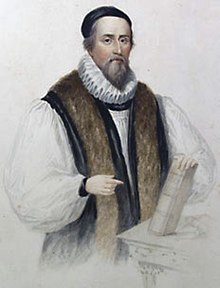 A fervent Puritan John Hooper examined all of his clergymen and
found that some did not even know the Lord's Prayer, the Ten Commandments or the Apostles' Creed. He set out to remedy this, and to
educate the people, preaching every day, often up to four or five times.
He was known for his kindness to the poor. The people of Gloucester
loved him. In spite of that, under the new government his marriage cost
him his position as bishop; and his views on the Lord's Supper (the
Eucharist) and other doctrines, cost him his life.
A fervent Puritan John Hooper examined all of his clergymen and
found that some did not even know the Lord's Prayer, the Ten Commandments or the Apostles' Creed. He set out to remedy this, and to
educate the people, preaching every day, often up to four or five times.
He was known for his kindness to the poor. The people of Gloucester
loved him. In spite of that, under the new government his marriage cost
him his position as bishop; and his views on the Lord's Supper (the
Eucharist) and other doctrines, cost him his life.
On February 9, 1555 he rose up early in the morning, when it was still dark, to pray.
When it was light, he asked that no one be allowed into his room until the hour of his execution, as he wished to continue in prayer.
If only he would change his religious opinions he could spare his life.
"If you love my soul, away with it!"he exclaimed, repeating the words for emphasis. Though his executioners had strict orders not to allow him to preach to the crowd he still could reach them with his words and asked the people to pray the Lord's prayer with him, which they did.
The reeds that were supposed to kindle the fire were so wet they had to rebuilt the fire three times.
The stump of the stake at which he was burned was rediscovered in the twentieth century and shown to the curious.
His writings influenced generations of Puritans and evangelicals.